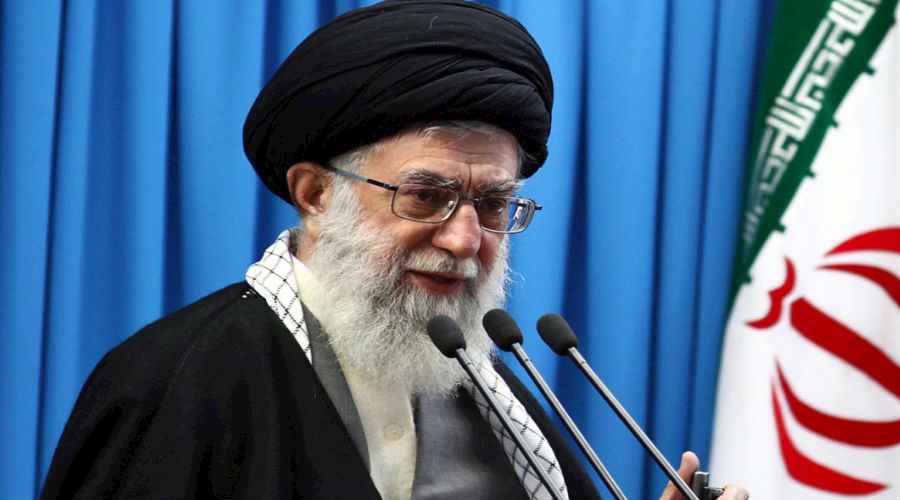After recent threats made by US President Donald Trump against Tehran, the growing tensions between Iran and the US have become a focal point of interactions among Iranian political forces readying for the presidential elections on May 19, 2017. The main currents of the political scene want to exploit the tensions to promote their political viewpoints and put pressure on rival currents to tilt the presidential elections in the favor of their own candidates against President Hassan Rouhani, who is running for a second term.
The 2011 house arrest of former Prime Minister Mir Hossein Mousavi, his wife the academic Zahra Rahnavard, and former Chairman of the Shura Council (parliament) Mehdi Karroubi is at the core of the ongoing debate between the political currents. Rouhani’s supporters want to settle the issue before the elections in order to boost the president’s chances of retaining his position for a second term. Furthermore, in his 2013 campaign promises, Rohani included a vow to play a prominent role in domestic Iranian interactions. The vow drew support from the middle class that have political heavyweights and play a prominent role in the domestic affairs.
However, the fundamentalist conservatives are trying hard to win the presidency and make a comeback after their huge loss in the last presidential elections, when four party members lost against Rouhani. Rouhani was able to win from the first round with a large margin. Conservatives are trying to prevent a resolution for the house arrest issue before the elections as this puts more pressure on Rouhani and his administration of moderates in general. This move could further undermines the middle class support for Rohani if he fails to fulfill his campaign promises.
At the same time, conservatives are counting on ongoing quarrels about the nuclear deal despite the fact that a year has passed since international sanctions against Iran were lifted. Such debates serve as indicator for Rouhani’s government failure to achieve its political and economic goals.
Khatami’s initiative
Former President Mohammad Khatami -a reformist accused of contributing to the Iranian political crisis in 2009 after the “Green Movement” rejected the results of the elections that gave then President Mahmoud Ahmadinejad a second term- proposed a new initiative known as “national reconciliation”. The aim of this intitative is to lift the house arrests of Mousavi and Karroubi, and diffuse tensions among the moderate camp. The moderates’ disquiet was apparent during the funeral of former President Hashemi Rafsanjani on January 9, 2017. Mourners chanted slogans supporting Mousavi and Khatami, while condemning a decision by authorities to ban Khatami from attending the funeral.
Khatami took advantage of two developments in order to add weight to his new proposal. First, the new challenges facing Iran after Trump’s victory and his advocacy of hardline policies towards Iran regarding three main issues: Iran’s breach of the nuclear deal; Tehran’s alleged support for terrorism; and human rights violations.
Khatami and the moderate current believe that dealing with pressure from Trump’s administration requires addressing the residual issues of the 2009 political crisis, which still linger until today. They claim the regime is in dire need of national unity and domestic cohesion to counter the gradually increasing pressure within the coming phase.
Secondly, this year marks the sixth anniversary of Mousavi and Karroubi’s house arrests, after they called for protests in 2011 to support the Egyptian revolution based on a Friday sermon by Supreme Leader Ali Khamenei. Khamenei had declared his support for the Egyptian revolution, which he said was, “inspired by the Iranian Islamic revolution.”
Those calling for national reconciliation led by Khatami believe that the current political conditions taking place in Iran vary differently from those existed six years ago. Accordingly, it is important to deal with this issue differently in order to encompass the negative implications it could have in the coming period, especially if Iran comes under more pressure from sudden developments on the foreign scene amid the rising concerns about Iran’s support for terrorism. Furthermore, there is the concern of Iran’s interference in the domestic affairs of regional countries and its negative role in wartorn countries. This was made evident in statements made by several officials participating in the February 17-19 Munich Security Conference. The statements imply that several international powers believe that the dispute with Iran is no longer limited to the nuclear deal, but also includes Iran’s support of terrorism.
Rapid containment
Although some members of conservative circles quickly supported Khatami’s new initiative, such as Deputy Shura Council Speaker Ali Motahari, a politician known for his public criticism of regime policies, others tried rapidly to contain the proposal by criticizing it and launching a smear campaign against Khatami.
This campaign presented Khatami as a key figure in what is known as the “sedition current”, a reference to the movement protesting the 2009 presidential results, and taking advantage of the same developments to justify their position.
In other words, ultra conservatives want to take advantage of escalation with Trump’s administration to implicitly accuse the moderate camp of serving the interests of foreign powers and relying on these powers to shore up support at home. It also continues to campaign against the nuclear deal.
Khamenei leads this campaign by rejecting the initiative for three main reasons. First, he does not believe there is a serious domestic crisis requiring national reconciliation since the majority of Iranians, in his view, support the regime. Second, Khamenei accuses foreign powers of stirring domestic turmoil in Iran by exaggerating disputes among political powers and sighting them as indicative of the regime’s weakness. Third, reconciliation with the “sedition current” could undermine the regime instead of easing tensions over policies he did not resolve.
The controversy over Khatami’s initiative is likely to escalate political disputes domestically in the weeks leading up to the presidential race. What remains is a toss-up, as both moderates and conservatives seek to clench victory and bolster their influence in regime’s institutions.


